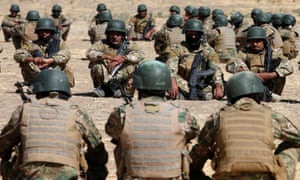October 10, 2016
Ajai Shukla reports.
As army para-commandos slipped silently across the Line of Control on September 28 on a perilous mission to punish anti-India jihadis and their Pakistani army backers, the Government of India quietly put the finishing touches on a plan to slash disability pensions for injuries incurred in the line of duty.
On September 30, the day after India began celebrating the successful 'surgical strikes', the ministry of defence issued a letter that dramatically reduced pensions for soldiers invalided out from the army after being crippled by battle injuries, or by injuries directly attributable to hazardous military service.
It was just as well that the commandos returned without significant casualties.
If a young soldier with severe injuries -- what cold medical jargon terms '100 per cent disability' -- from that operation had been invalided out from service, he would have found his monthly pension slashed from Rs 45,200 to just Rs 27,200 -- down by Rs 18,000 a month.
The team leaders in the 'surgical strikes', majors with 10 years of service, have been hit even harder -- with pension for 100 per cent disability slashed by over Rs 70,000 a month.






